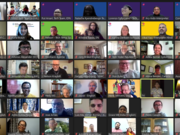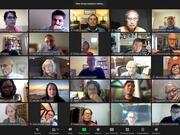-
After Zoom, prayers carry on
Online Prayer Hour doesn’t end when the hour does. Not only do participants in Mennonite World Conference’s bimonthly prayer meeting continue for another 15 minutes – greeting each in other in a pandemonium of languages – they also carry prayers back to their local congregations. On 18 March 2022, participants in breakroom rooms prayed in
-
“We don’t live by fear”
Mennonites stand in the breach through prayer “And I sought for anyone among them who would repair the wall and stand in the breach before me on behalf of the land,” writes the prophet Ezekiel (22:30). On 19 November 2021, more than 110 members of Mennonite World Conference from Argentina to Zimbabwe rose to pray for the world.
-
A weekend of prayer and action against hunger 2021
“Give us each day our daily bread” Across the globe, more than 41 million people – around half of them children – are now at risk of starvation in 43 countries. The global hunger crisis is driven by conflict, by climate change; and by the economic impacts of COVID-19. Even in countries where some have
-
MWC continues pastoral response to COVID-19
In the early days of the COVID-19 pandemic, stories poured in from MWC member churches about job loss and hunger in their congregations and communities due to shut downs. Mennonite World Conference began collecting funds to respond to pandemic-related needs within and through the household of faith. A year into the pandemic, MWC is blessing
-
Week of prayer on COVID-19 pandemic
Monday 22 March 2021 Day One Prayers of Lament (We lament the more than 2 million people who have died and the deadly impact of the pandemic on the vulnerable, especially children.)* Opening Prayer God who sees all and knows all,your eyes are upon us, your children, in this our time of pain and suffering. We

